The Vedas are considered to be the oldest religious texts in the world, dating back to ancient India. Comprising of a vast collection of hymns, rituals, and knowledge, the Vedas serve as the foundation of Hinduism, the world’s third-largest religion.
Many renowned scholars, philosophers, and thinkers throughout history have studied the Vedas, seeking wisdom and insight into the mysteries of life. As a result, there are many quotes from the Vedas that offer profound insight into the human experience, spirituality, and the nature of reality.
These quotes are often used as a source of inspiration and guidance, providing a deeper understanding of the Vedic teachings and their relevance to our lives today. In this context, exploring quotes from the Vedas can be a fascinating and enlightening journey for anyone seeking knowledge and spiritual growth.
1. “The wise see knowledge and action as one. They see truly and go beyond death.” – Brihadaranyaka Upanishad
Meaning: This quote conveys the idea that wisdom involves not just knowing but also applying that knowledge. It’s through the combination of understanding and action that one can truly transcend the cycle of life and death.

2. “True success comes to those who are content with what they have.” – Mundaka Upanishad
Meaning: The quote suggests that genuine success and fulfilment come from being satisfied with one’s present condition, not from the pursuit of more possessions or achievements.

3. “Contentment is the greatest wealth of all.”– Atharva Veda
Meaning: This quote indicates that being satisfied with what one has is a greater treasure than any material possessions.
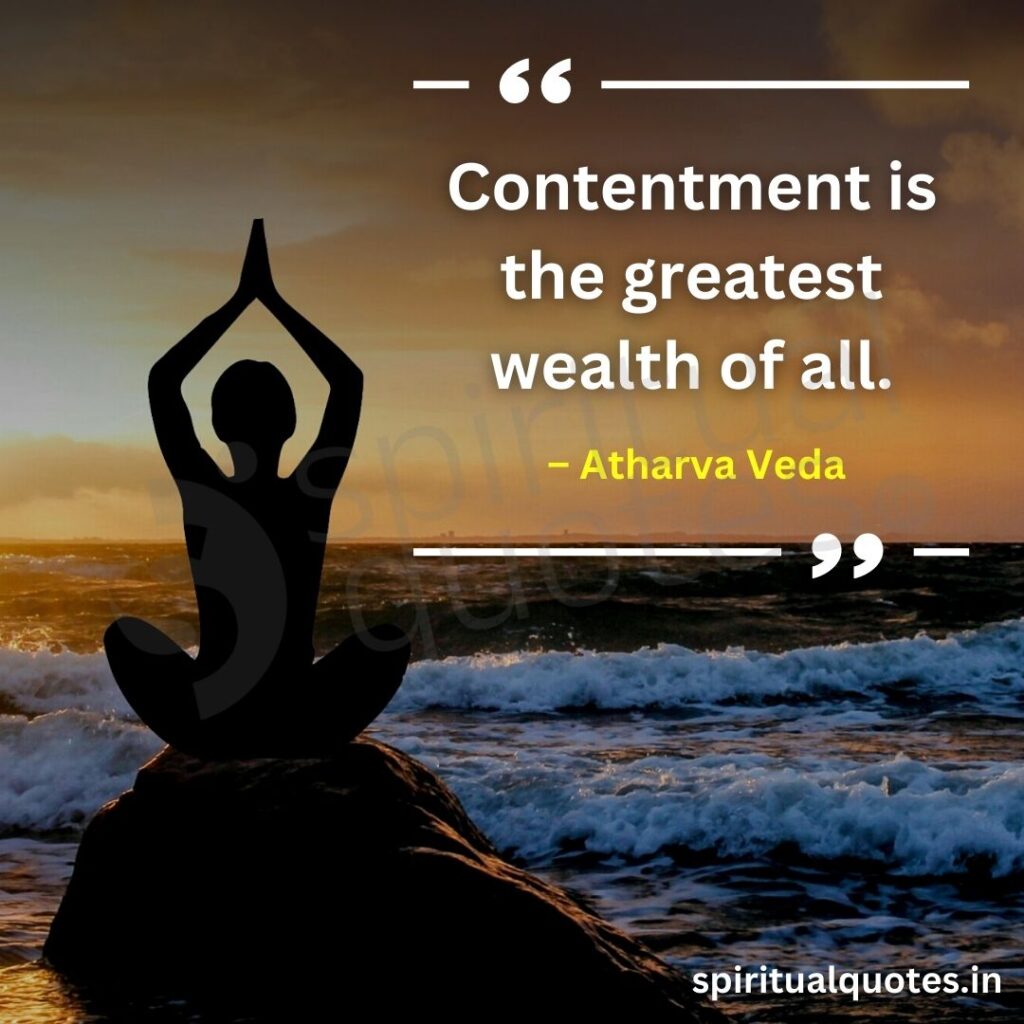
4. “Knowledge is better than wealth; Contentment, better than many kinds of riches.” – Taittiriya Upanishad
Meaning: This quote emphasizes the superiority of knowledge over material wealth and contentment over various forms of earthly riches.

5. “The man who realizes himself through meditation attains a serenity that surpasses everything else in this world.” – Chandogya Upanishad
Meaning: This suggests that an individual who attains self-realization through meditation experiences a peace that transcends all worldly matters.
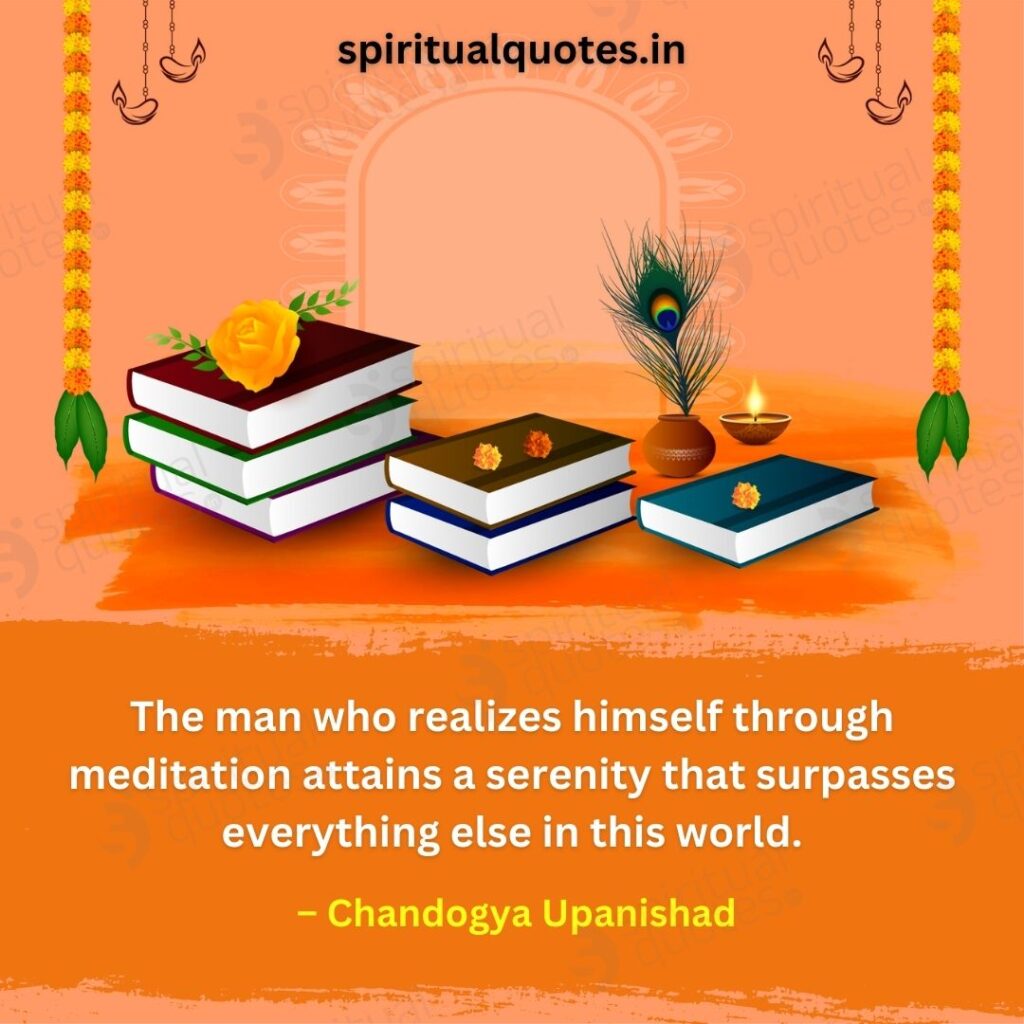
6. “The wise man knows that his true Self is the same as all other beings and that he should treat them with compassion.” – Bhagavad Gita
Meaning: This quote states that wisdom involves recognizing the interconnectedness of all beings and treating them with kindness and understanding.

7. “Actions have consequences; therefore, one must be careful to act in a way that will bring about good results.” – Mahabharata
Meaning: This quote emphasizes the principle of karma, suggesting that our actions have repercussions and we should therefore act responsibly to ensure positive outcomes.

8. “One who has conquered himself and attained freedom from desire is indeed the most blessed of all living beings.” – Svetashvatara Upanishad
Meaning: This means that true liberation and happiness are attained by overcoming one’s desires and achieving self-control.

9. “The highest knowledge is to understand that everything is part of one unified reality and that this unity cannot be disturbed by any external force.” – Kaushitaki Upanishad
Meaning: This quote suggests that supreme wisdom involves recognizing the oneness of existence and the unshakeable nature of this unity, regardless of external influences.
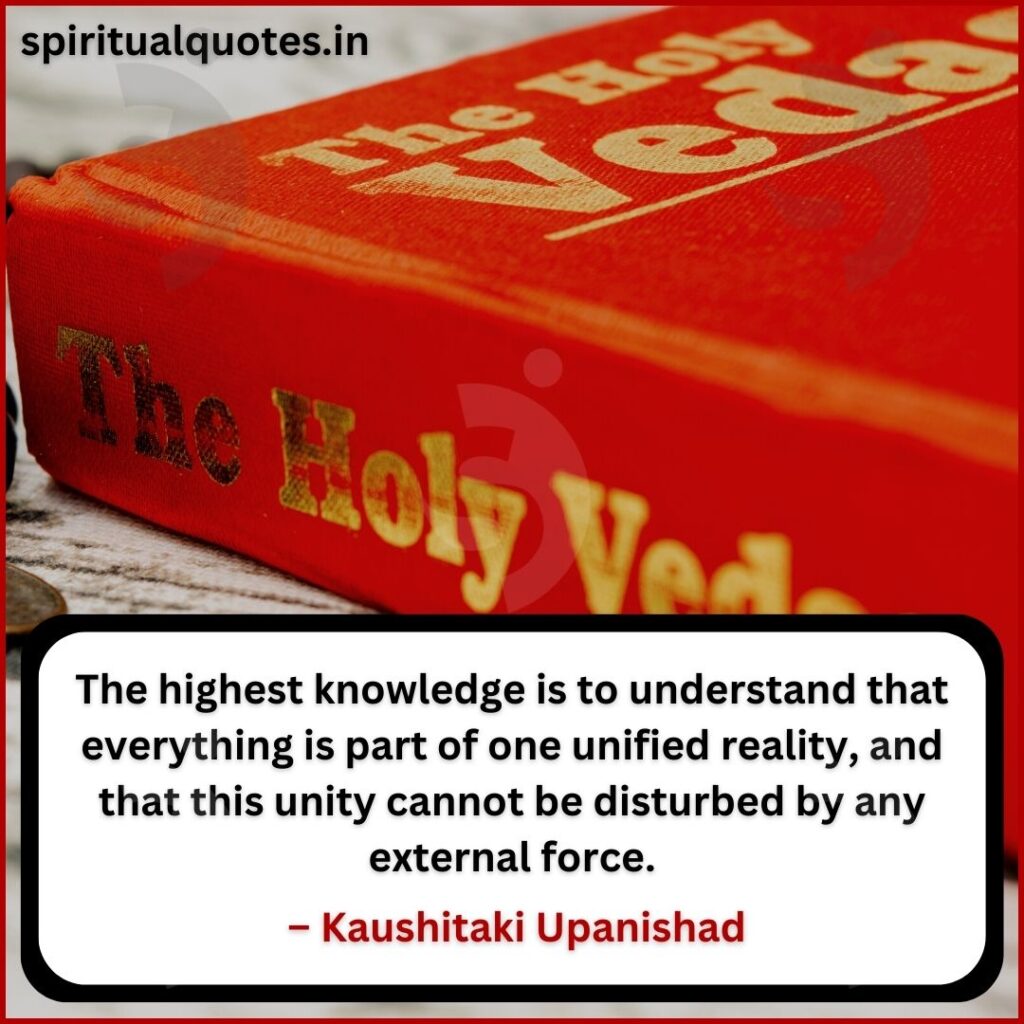
10. “The man of knowledge sees the Self in all creatures and all creatures in the Self. He sees everywhere oneness.” – Katha Upanishad
Meaning: This implies that a person with true wisdom perceives the divine presence in all beings and realizes the interconnectedness and unity of all life.
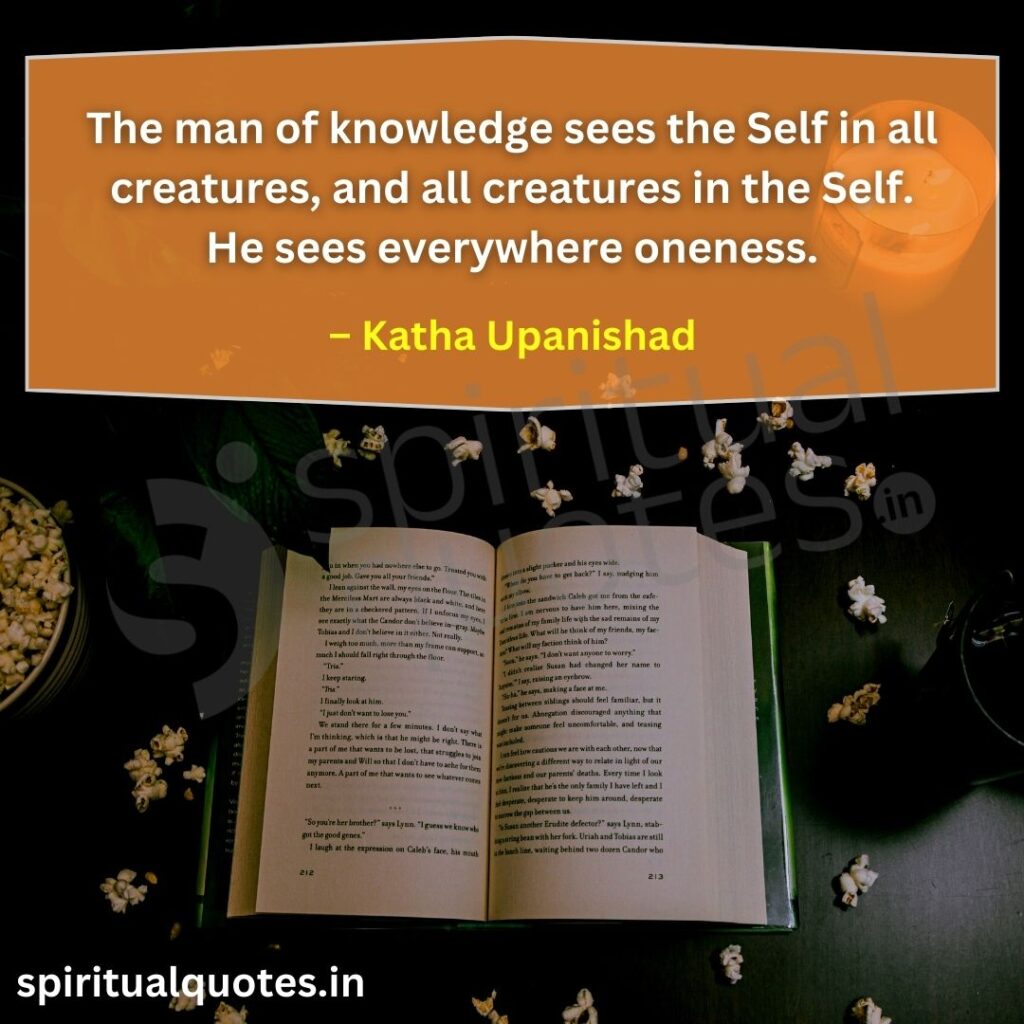
11. “One who acts without attachment and desire is said to have attained perfection.” – Bhagavad Gita
Meaning: This quote teaches that the one who performs their duties without attachment to the results or driven by desire is considered spiritually evolved or perfect.

12. “What one desires, another desire not; therefore, let everyone pursue his own way according to his own understanding.” – Shvetashvatara Upanishad
Meaning: This suggests that desires vary from person to person. Hence, everyone should follow their own path based on their unique understanding and inclination.

13. “Those who seek the truth will be enlightened.” – Mundaka Upanishad
Meaning: This quote expresses the idea that those who earnestly seek truth and understanding will eventually find enlightenment.

14. “Let a man stay in truth, for truth alone is the highest virtue.” – Brhadaranyaka Upanishad
Meaning: The quote signifies that upholding truth is the greatest moral virtue one can cultivate.

15. “The wise should not seek revenge or hatred; instead, they should cultivate love and compassion.” – Bhagavad Gita
Meaning: This quote suggests that a wise person should avoid negative emotions like revenge and hatred, focusing instead on fostering love and compassion.

Meditation Quotes
16. “He who meditates on the Atman attains supreme bliss, beyond all sorrows and sufferings.” – Mandukya Upanishad
Meaning: This quote indicates that meditating on one’s true self (Atman) leads to a state of supreme bliss, beyond all earthly sorrows and pain.

17. “The enlightened man sees himself in all beings and all beings in himself.” – Isha Upanishad
Meaning: This suggests that an enlightened person recognizes the divine essence in all beings, and sees himself in everything around him.

18. “The supreme Self is everywhere. It can never be destroyed or stained by any external force.” – Taittiriya Upanishad
Meaning: The quote suggests that the supreme Self or the divine essence is omnipresent and remains invincible and untouched by any external force.
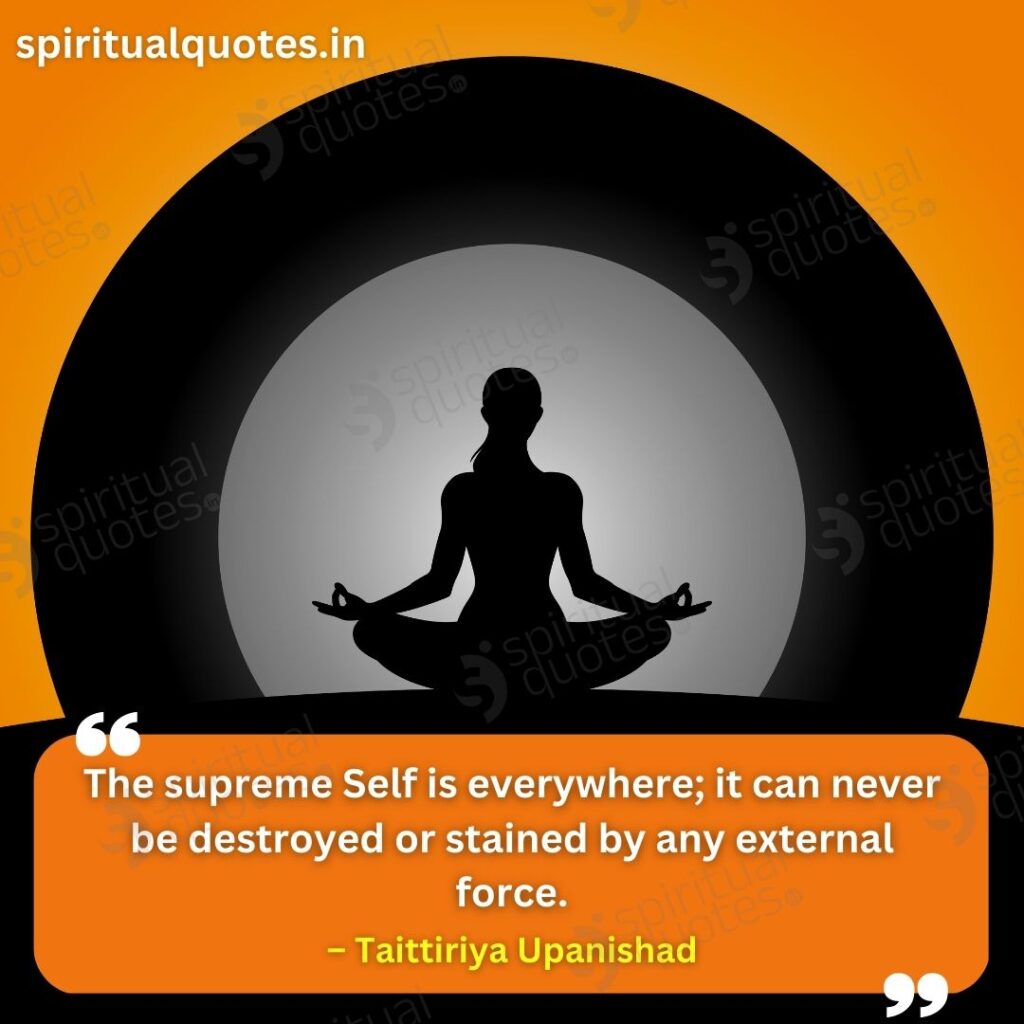
19. “The enlightened man remains untouched by the vicissitudes of life. He is unaffected by joy and sorrow, pleasure and pain.” – Bhagavad Gita
Meaning: This quote signifies that an enlightened person remains stable and unaffected amidst the ups and downs of life, neither swayed by happiness nor sorrow.

20. “Those who realize the unity of all creation are liberated from fear and ignorance.” – Katha Upanishad
Meaning: This suggests that understanding the oneness of all existence liberates one from fear and ignorance, leading to enlightenment.
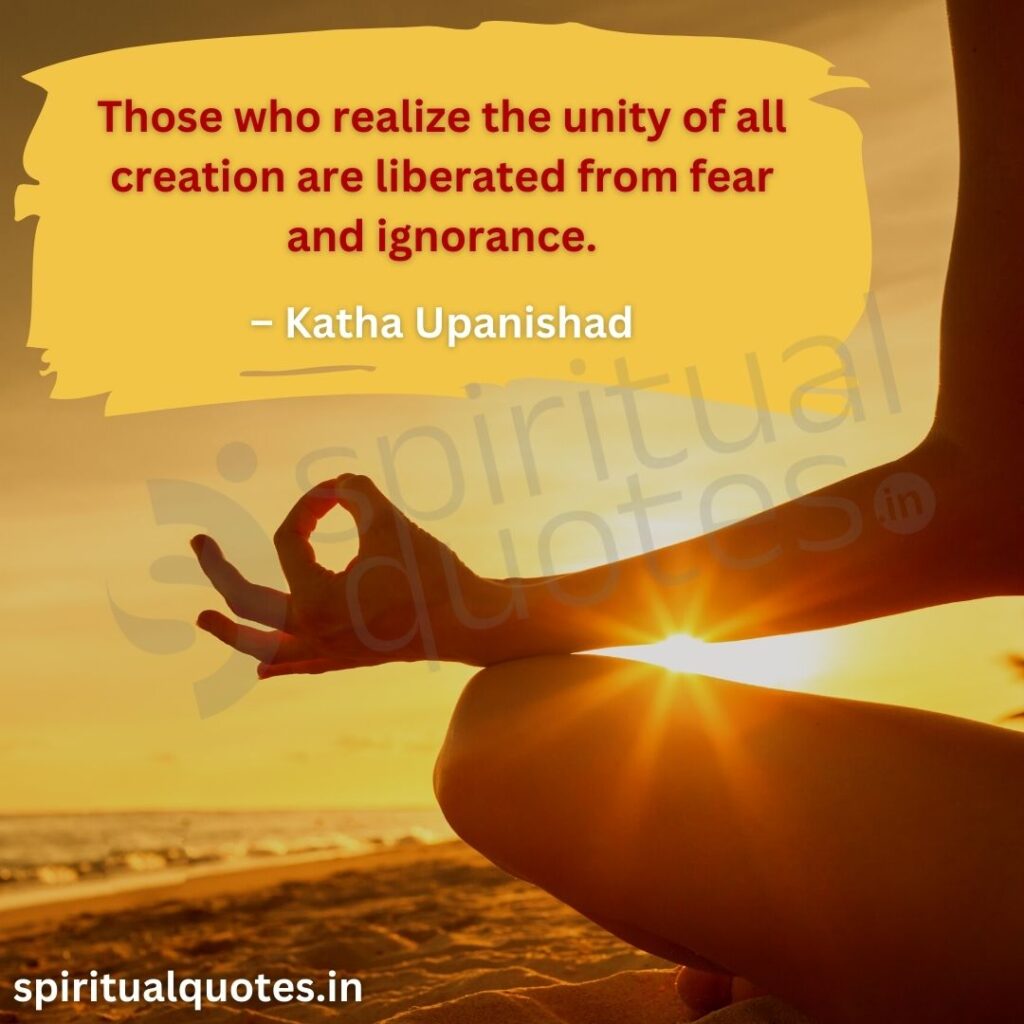
21. “He who knows his true self discovers the source of immortality and eternal bliss.” – Svetashvatara Upanishad
Meaning: This indicates that self-realization leads to understanding the eternal nature of the self and experiencing everlasting happiness.
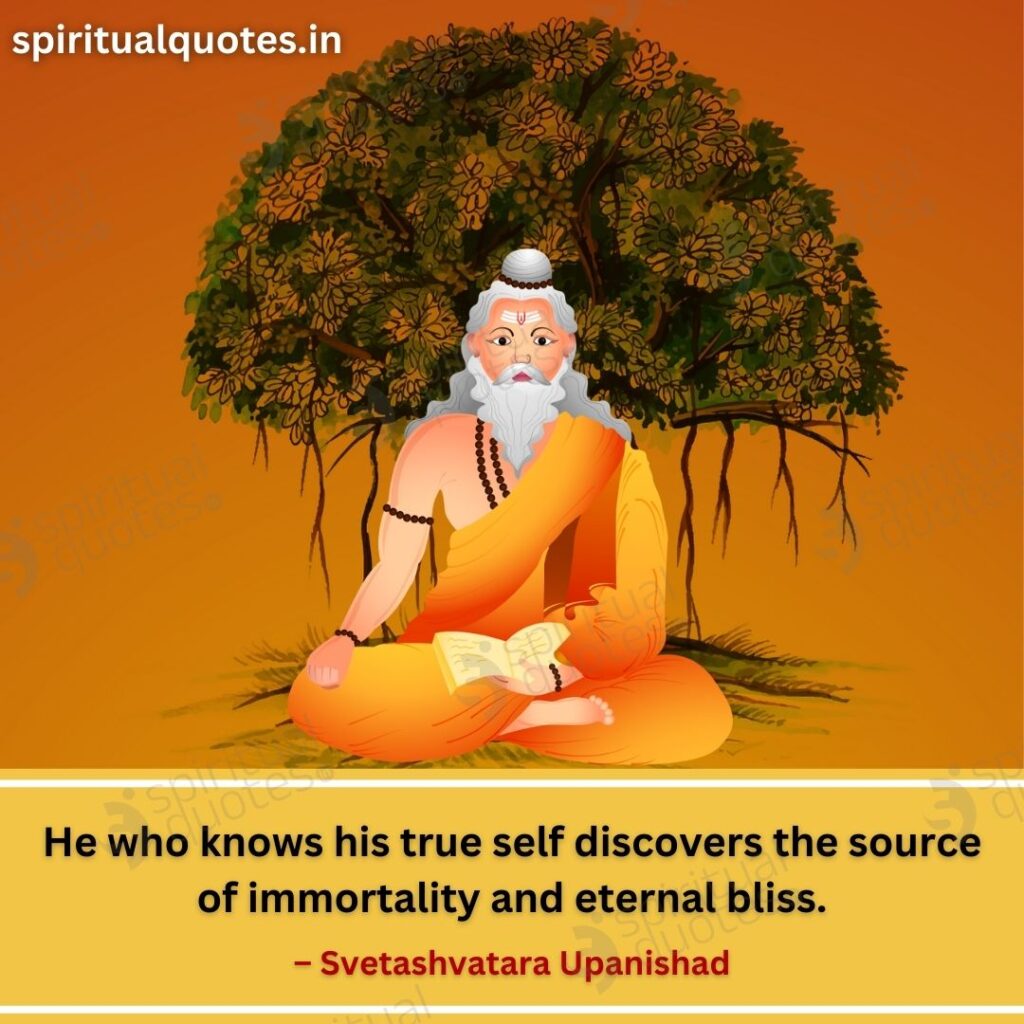
22. “The wise man should not be moved by either pleasure or pain, but remain steady and unmoved as a rock.” – Bhagavad Gita
Meaning: This quote teaches that wisdom involves remaining stable and undisturbed in the face of both pleasure and pain, like an unyielding rock.

23. “One who has conquered himself is truly great; he is his own master, no one can control him.” – Mahabharata
Meaning: This implies that true greatness comes from mastering one’s self and desires, resulting in an autonomy that cannot be manipulated by others.

24. “The wise should not be attached to the things of this world. They should seek their peace in the Atman, the source of all existence.” – Chandogya Upanishad
Meaning: This teaches that wise individuals should avoid worldly attachments and seek inner peace through their true selves (Atman), the root of all existence.

25. “The universe is One: everything else is an illusion created by our minds.” – Mandukya Upanishad
Meaning: This quote suggests that the ultimate reality is oneness; all other distinctions and separations are merely illusions created by our minds.
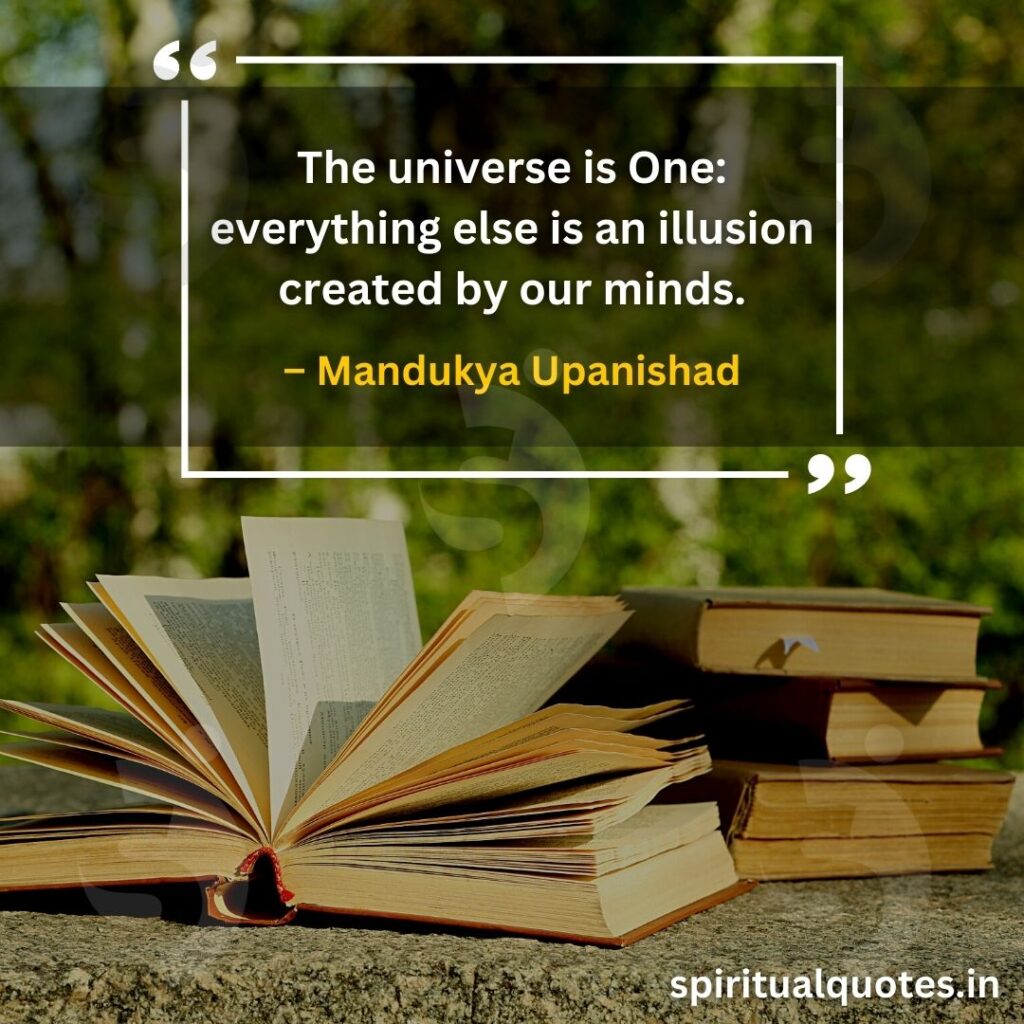
26. “Those who have attained true knowledge are always content and satisfied; they have no need for material possessions.” – Taittiriya Upanishad
Meaning: This indicates that individuals with true wisdom find contentment and satisfaction within themselves, without relying on material possessions.

27. “The wise should strive to be unattached to the results of their actions.” – Bhagavad Gita
Meaning: This advises that wise people should act without attachment to the outcomes, focusing solely on performing their duties.

28. “He who knows his true Self is free from fear and anxiety.” – Katha Upanishad
Meaning: This quote suggests that understanding one’s true self eliminates fear and anxiety, bringing peace and tranquillity.

29. “The path of wisdom leads to liberation, while the path of ignorance leads only to suffering.” – Mundaka Upanishad
Meaning: This quote contrasts the paths of wisdom and ignorance, suggesting that wisdom leads to liberation, while ignorance results in suffering.
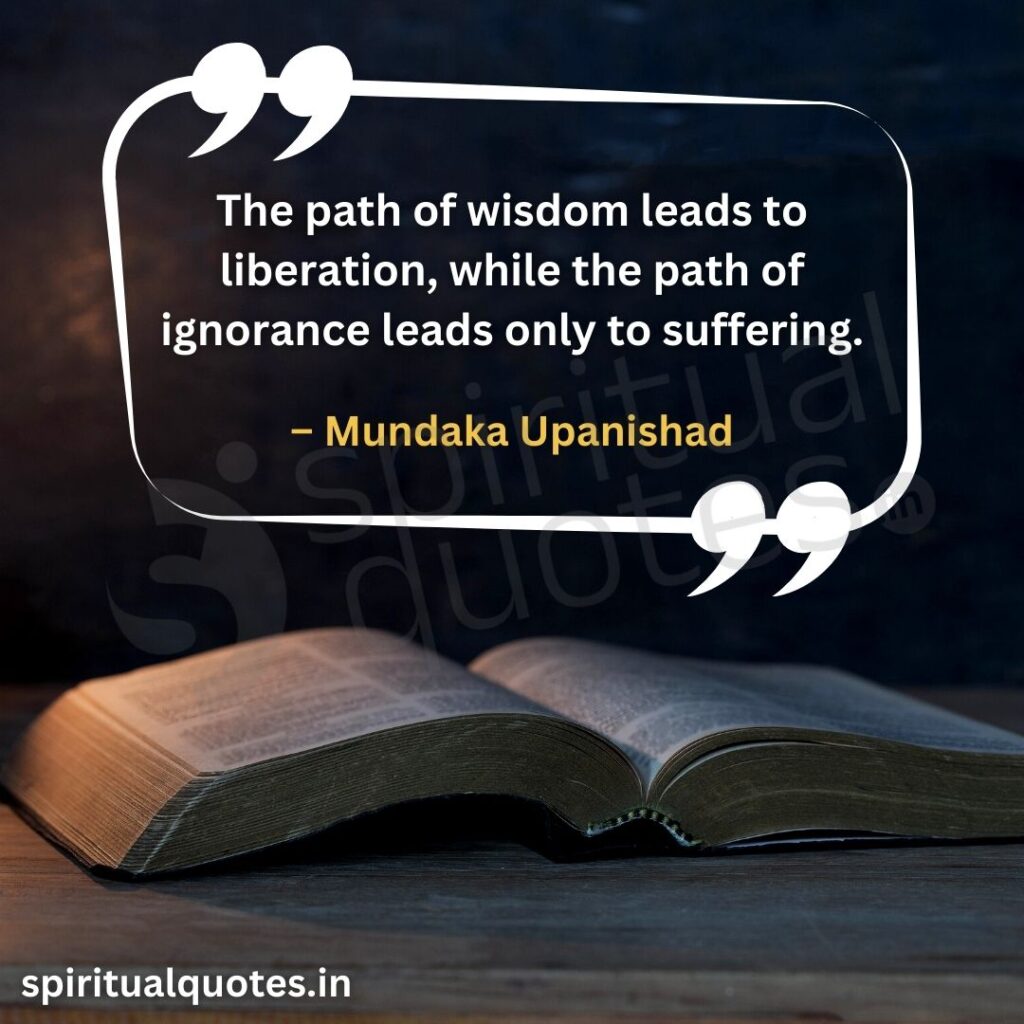
30. “Let a man take delight in that which brings him peace; all else is mere delusion.” – Isha Upanishad
Meaning: This quote emphasizes that individuals should pursue what brings them peace, suggesting that other pursuits are likely to be deceptive or illusory.
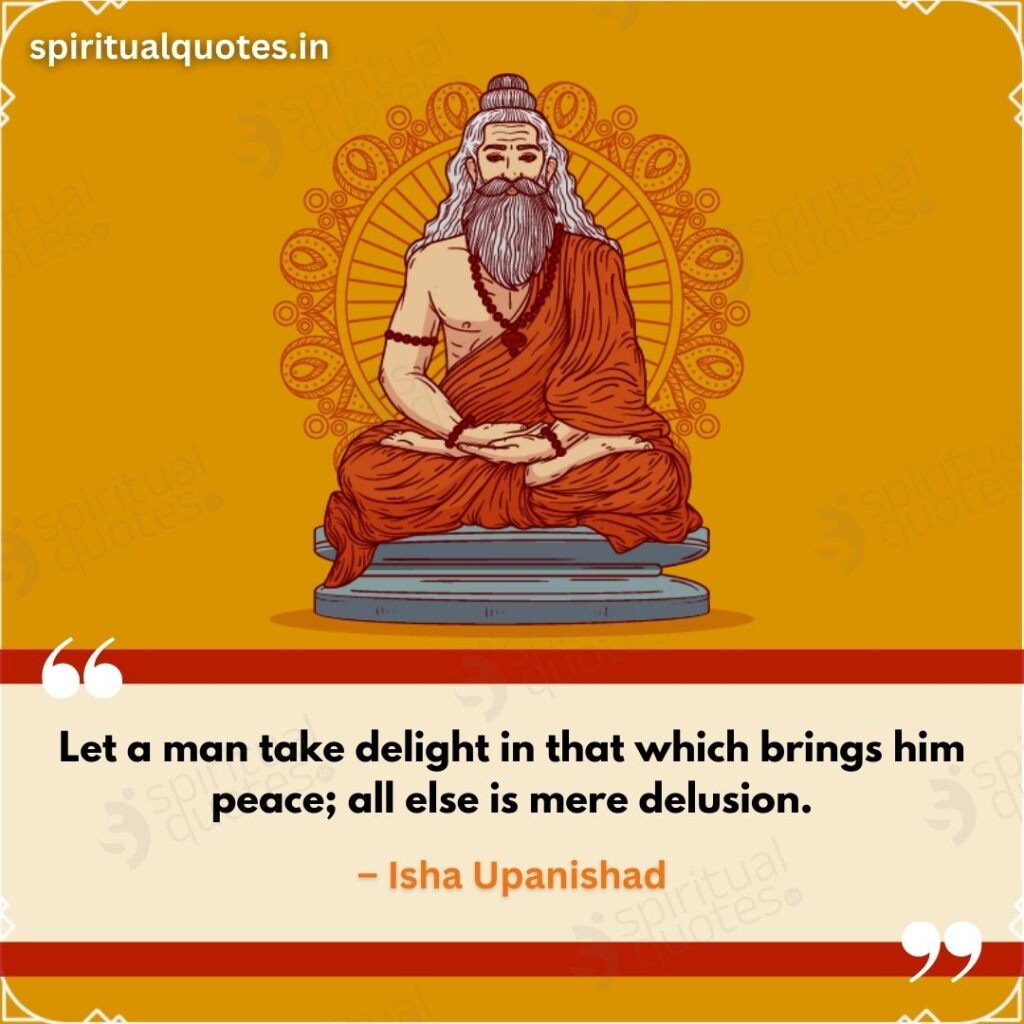
Quotes on Karma in Vedas
31. “True contentment comes from within; it cannot be found in outward things.” – Bhagavad Gita
Meaning: This indicates that genuine contentment arises from within oneself, not from external sources or material possessions.
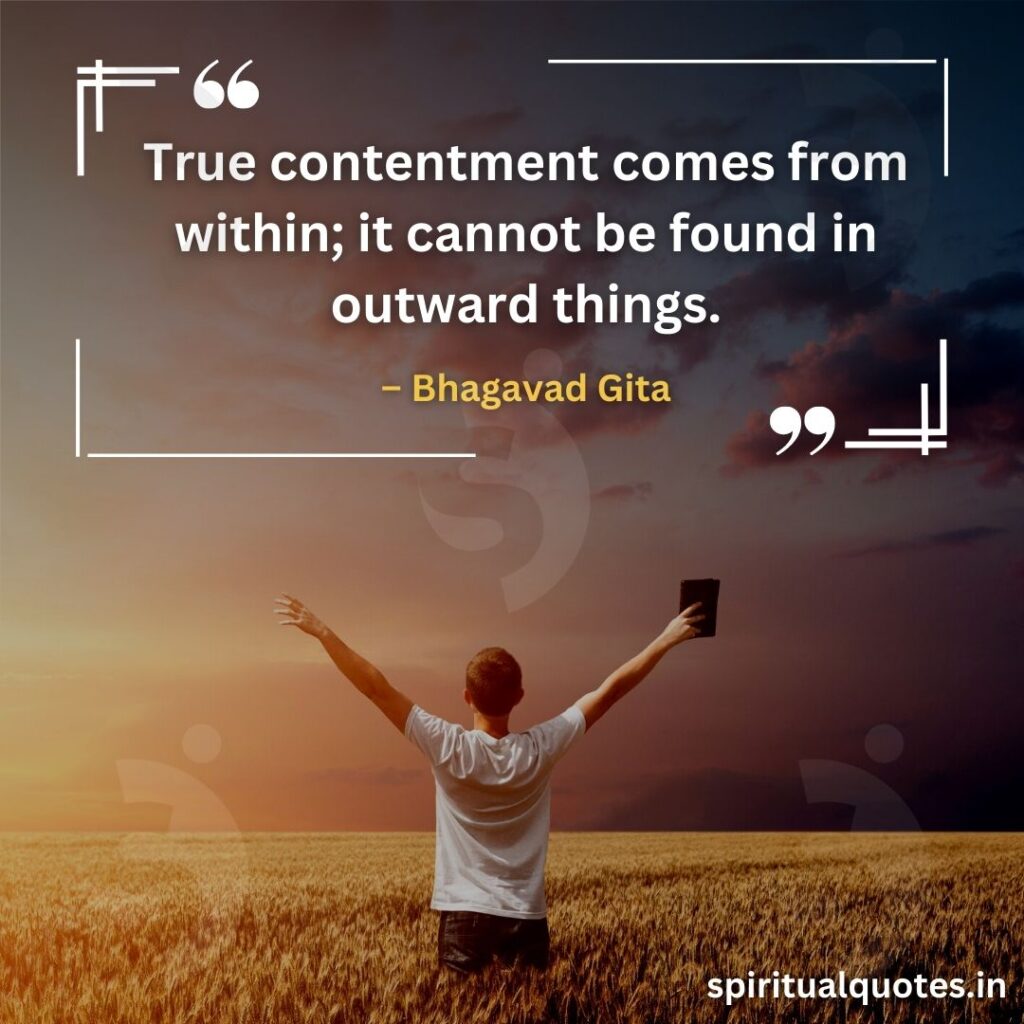
32. “Those who are wise do not depend on the fruits of their actions, but act without attachment to their works.” – Svetashvatara Upanishad
Meaning: This suggests that wisdom involves acting without an expectation for the results, focusing instead on the action itself.

33. “The enlightened man is like a lake whose waters remain clear and still, untouched by whatever may come it’s way.” – Kaushitaki Upanishad
Meaning: This quote describes an enlightened individual as akin to a calm, clear lake, undisturbed by external factors.

34. “He who has conquered his mind conquers all his enemies; he alone can claim to have attained perfection.” – Brhadaranyaka Upanishad
Meaning: This teaches that by mastering one’s mind, one can overcome all challenges and obstacles, achieving a state of perfection.
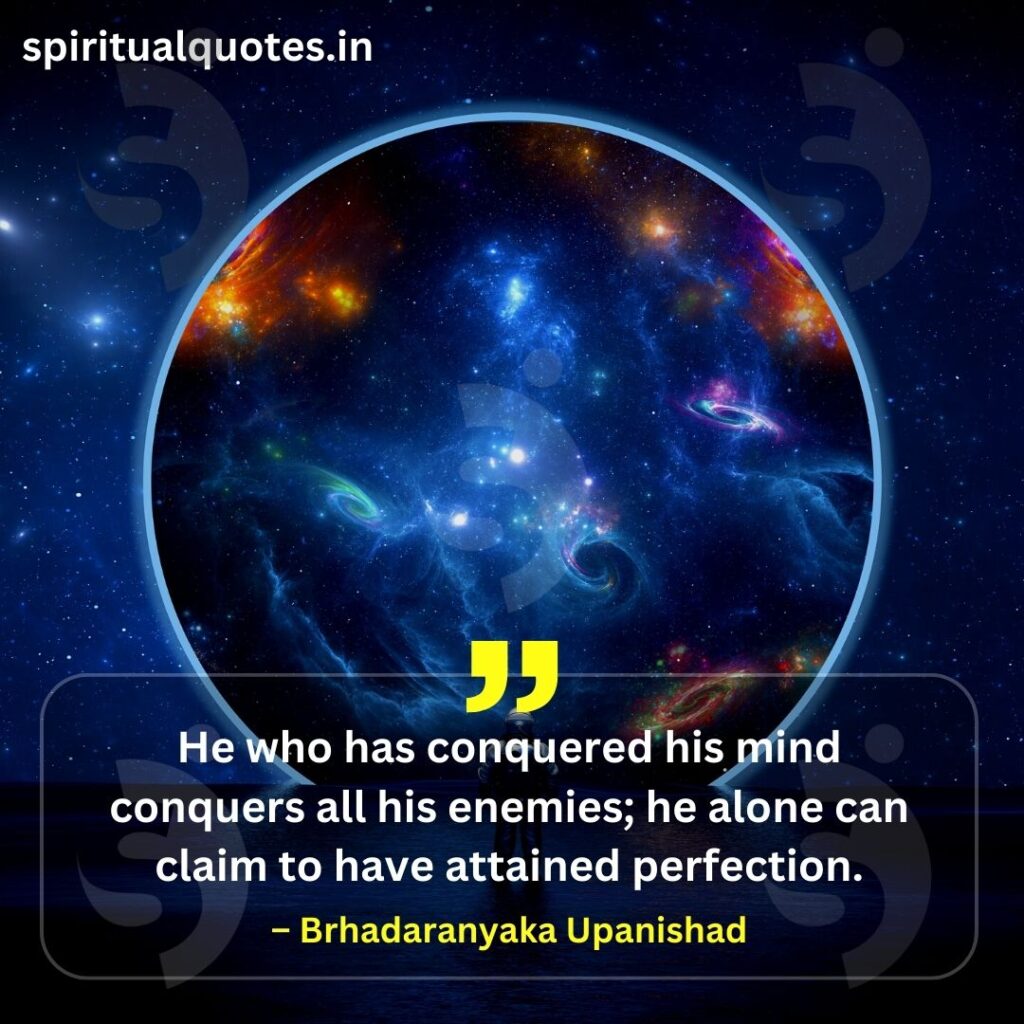
35. “One should strive for mental purity and clarity, for this is the only way to true peace and freedom.” – Chandogya Upanishad
Meaning: This quote emphasizes the importance of cultivating mental clarity and purity as the path towards achieving true peace and freedom.
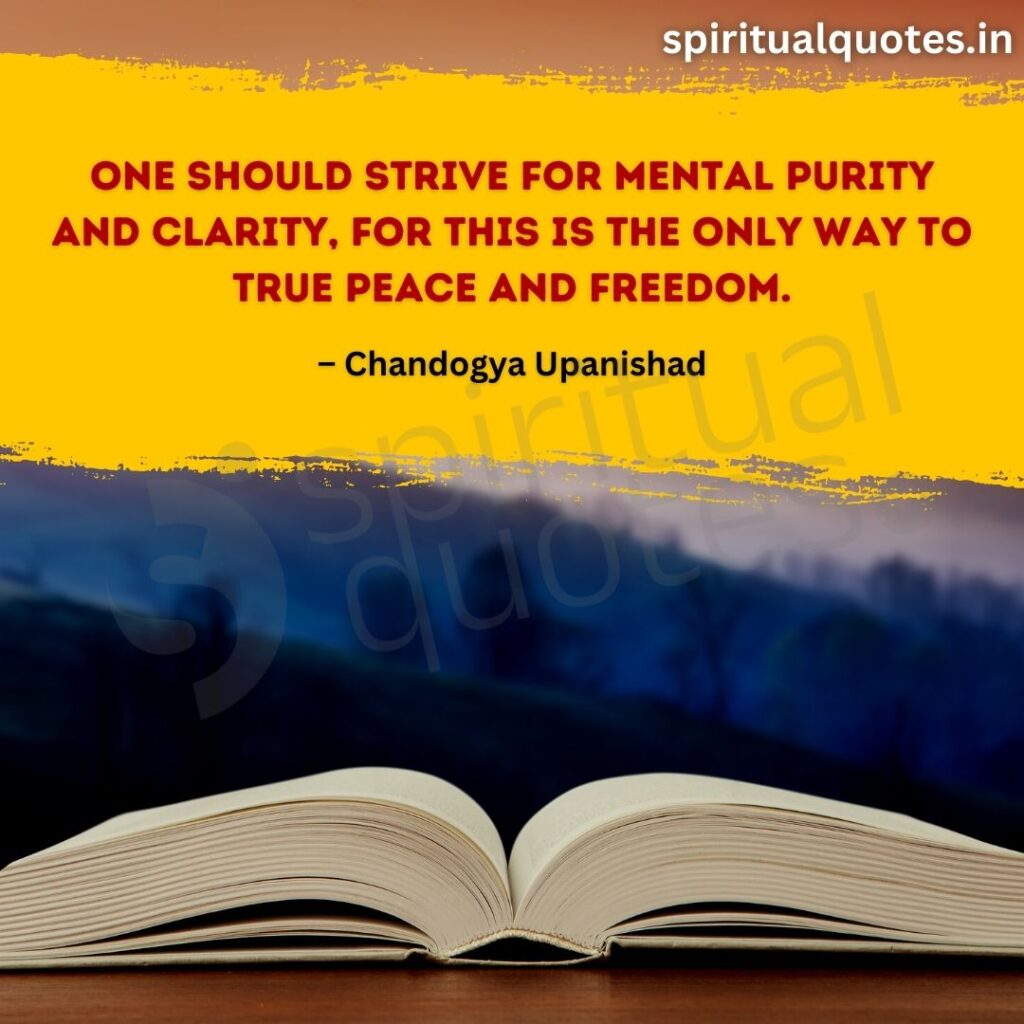
36. “The wise man should see the good in all, for then his vision will be filled with light and joy.” – Mahabharata
Meaning: This suggests that a wise person should recognize and appreciate the good in everyone and everything, resulting in a perspective filled with positivity and joy.

37. “The enlightened one sees no difference between himself and others; he has reached a state of perfect harmony.” – Taittiriya Upanishad
Meaning: This implies that an enlightened individual perceives no distinction between himself and others, having achieved a state of perfect unity and harmony.

38. “He who knows the truth of his own being becomes free from all bondage; this is true liberation.” – Isha Upanishad
Meaning: This suggests that recognizing one’s true self leads to liberation from all forms of restrictions and limitations, signifying true freedom.

39. “True knowledge is not gained by mere study; it comes from within, through deep meditation and contemplation.” – Mundaka Upanishad
Meaning: This teaches that genuine knowledge isn’t just obtained through intellectual study but arises from within oneself, through deep introspection and meditation.
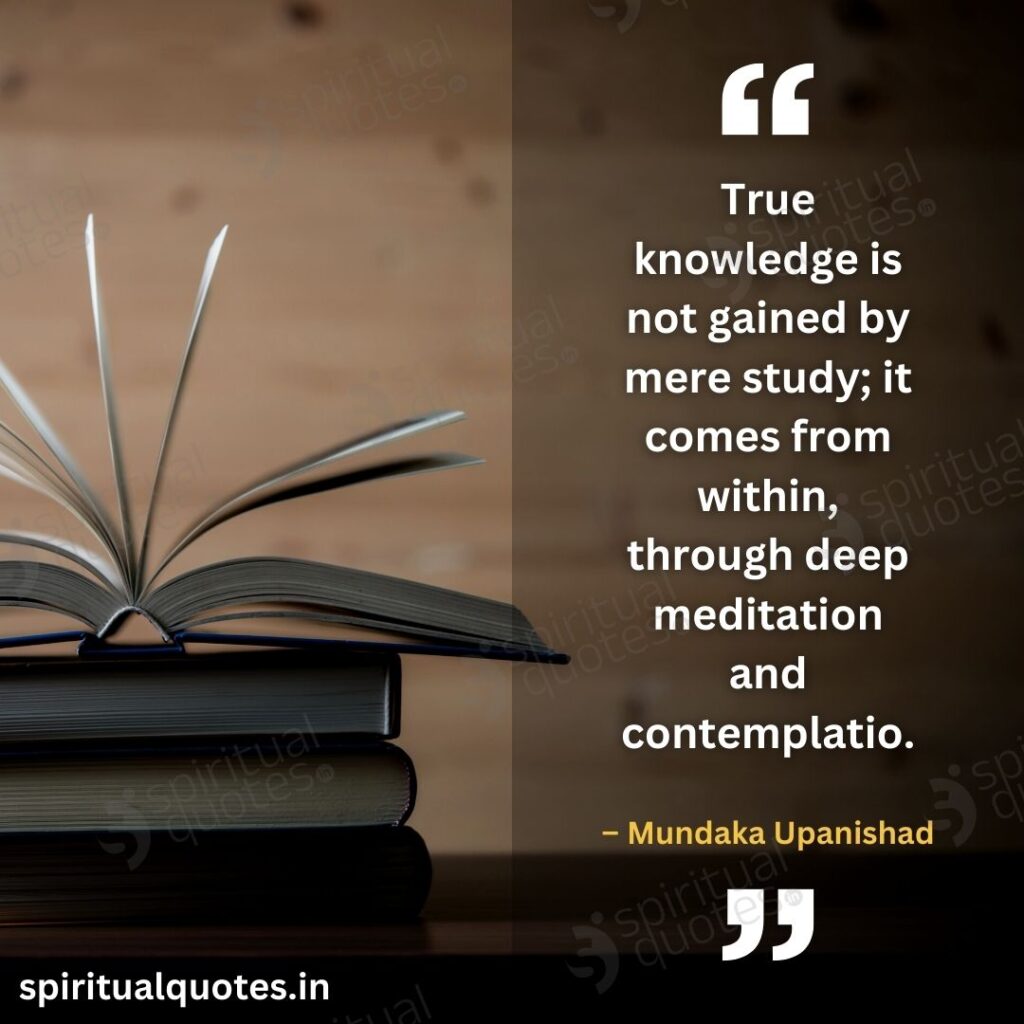
40. “The wise man should seek the company of those who are wiser than him; he will find in them a source of enlightenment.” – Kaushitaki Upanishad
Meaning: This implies that seeking out and learning from those who are wiser can be a path to personal growth and enlightenment.

41. “Let your heart be filled with love and compassion for all living beings; this will lead you to peace and fulfilment.” – Bhagavad Gita
Meaning: This quote suggests that fostering love and compassion towards all living beings can lead one to a state of inner peace and satisfaction.

42. “He who has found the inner peace that comes from transcending all desires has attained true freedom.” – Svetashvatara Upanishad
Meaning: This teaches that overcoming desires and finding inner peace is the key to achieving true liberation.

43. “The enlightened man lives in perfect harmony with the laws of Nature and the universe; he is unfettered by anything material.” – Brhadaranyaka Upanishad
Meaning: This implies that an enlightened person lives in alignment with the natural laws of the universe, unattached to material possessions or worldly concerns.
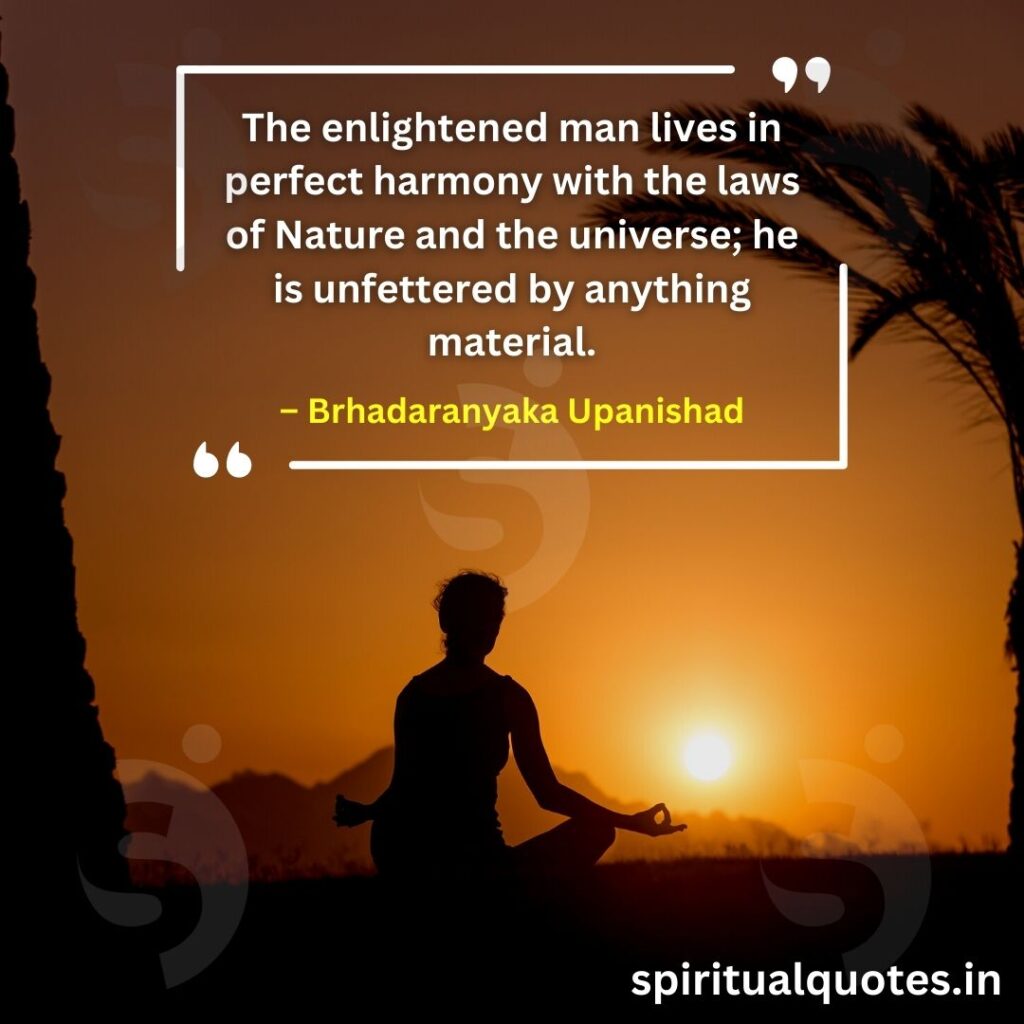
44. “Let one direct all his actions towards liberating himself from ignorance and attaining true knowledge; this is the highest goal of life.” – Katha Upanishad
Meaning: This quote stresses that the ultimate goal in life should be the pursuit of true knowledge and liberation from ignorance.

45. “Those who know their true selves are never swayed by external forces and remain rooted in their inner peace no matter what may come their way.” – Chandogya Upanishad
Meaning: This teaches that those who know their true self stay grounded in their inner peace and are not swayed by external circumstances.
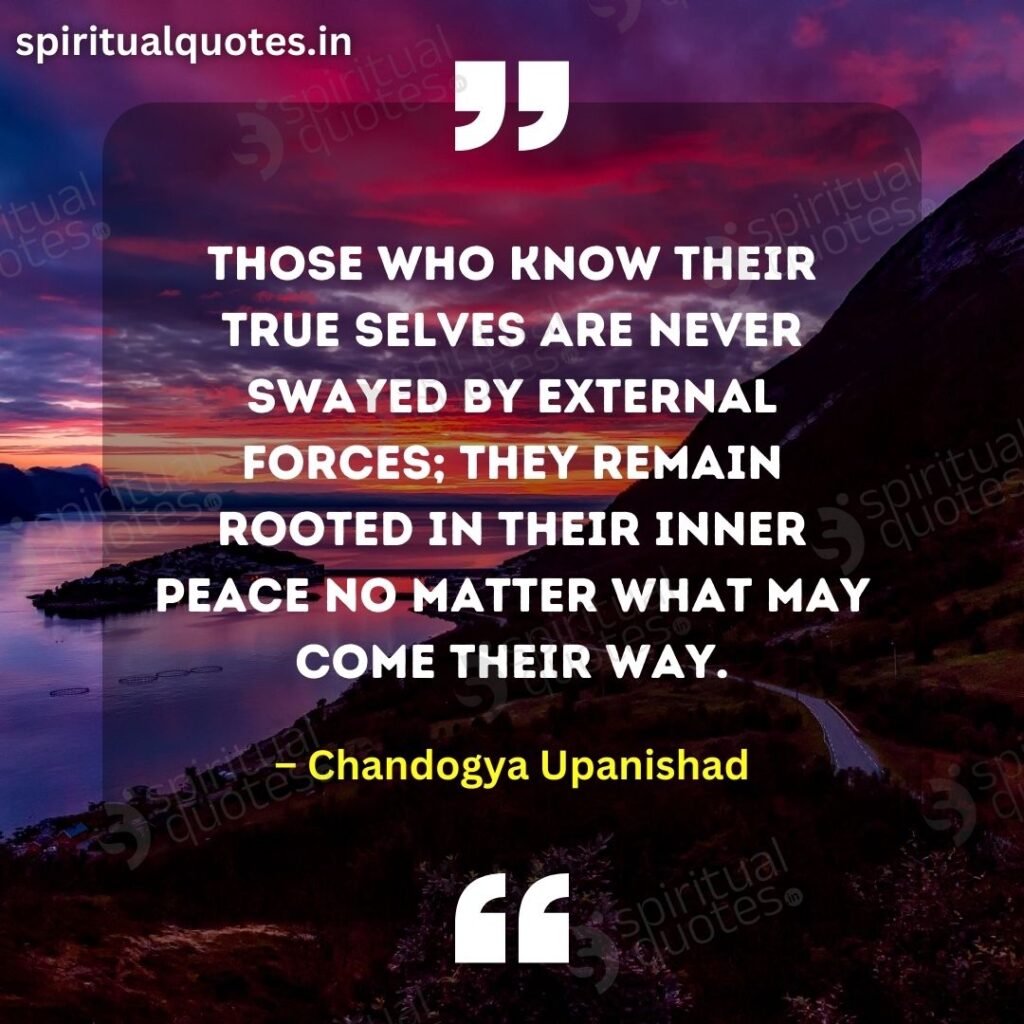
46. “By striving to act without attachment, one can find true freedom from suffering.” – Mahabharata
Meaning: This suggests that acting without attachment to the results can lead to liberation from suffering.

47. “The wise man disregards all distinctions of caste, creed, colour or gender; he sees only what is essential in each person.” – Taittiriya Upanishad
Meaning: This quote conveys that a wise person doesn’t focus on superficial distinctions like caste, religion, color, or gender, but recognizes the essential humanity in each individual.

48. “The enlightened one seeks no reward for his actions; he acts purely out of love and compassion for all living beings.” – Isha Upanishad.
Meaning: This quote implies that an enlightened individual acts not for personal gain or reward but purely out of love and compassion for all living beings.

Conclusion
The quotes in the Vedas offer timeless wisdom that transcends cultural and religious boundaries. The insights contained in these quotes speak to the deepest aspects of human experience. It offers guidance on how to live a more meaningful and fulfilling life, just like Buddha Quotes.
Whether one is seeking spiritual enlightenment, philosophical insight, or practical advice. The Vedas provide a rich source of inspiration and knowledge that has been revered for thousands of years.
Exploring quotes in Vedas can be a powerful tool for self-reflection and personal growth. Helping us to connect with our inner wisdom and explore the mysteries of existence.


